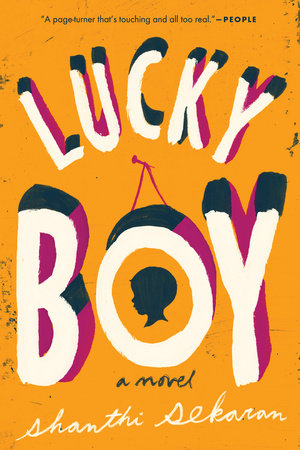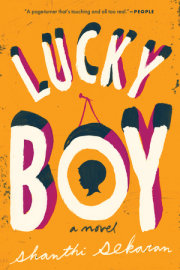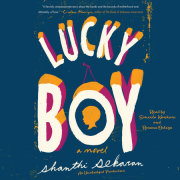Prologue Clara, patron saint of television and eye disease, stood three feet tall in the church at the end of the road. The road was known generally as
la calle, for it was the only one in the village, narrow, sprouting caminos and footpaths as it went. Scattered along it were one church, one store and a one-room schoolhouse, recently closed. The road ended in a small square, where the town hall stood, and a cantina with the town’s only television. It sat on a foldaway table, and when the men weren’t hunched around it watching the football, it spun lazy afternoon offerings of love and betrayal, murder and long-lost sons.
Clara, beauty of Assisi, nobleman’s daughter, ran away one night to a friar at the roadside, was brought to Saint Francis and shorn. Her hair fell like cornsilk to the ground and she traded her dress for a rough brown habit. She walked barefoot and lived in silence and begged for her daily bread. But she didn’t mind. She’d fallen in love with something larger than her world.
Clara was ill one day, Papi said, and couldn’t go to mass. She lay faded in her bed, and what flickered on her wall but a vision of the daily service, from processional to homily to eucharist? And so they made her patron of eye disease, because what could have visited her but a dance of glaucomic flashes? And then television came along and needed a patron, and the pope said
Clara. And how about the time, Papi once said, when she faced down an invading army, alone at the convent window with nothing but the sacrament in hand? Now, Clara spent her days tucked into a dim chapel. Day in, day out, alone in the shadows, and if anyone did visit, it was only because they wanted something.
But that night was La Noche del Maiz. The village priest brought her down from her perch and wiped tenderly her web of whisper-fine cracks. He wrapped her in finery, silk robes and nylon flowers, and loaded her on her platform. Four strong men raised her high and she wobbled down the road but didn’t fall—not once had she fallen—and so it began: a trumpet’s cry, a line of altar boys, the swing of a cloud-belching censer.
Fine for a saint, thought Solimar, to wait all year for a single tromp through the village. Fine for a saint to spend all of eternity with her mouth shut, her feet still. Solimar Castro Valdez was no saint. She was breaking out. She’d come out that evening to meet a man, not a friar. His name was Manuel. He owned a car and a passport—the right kind—and he’d be taking her away from this place. And he was there. Right there in Santa Clara Popocalco.
For months, the idea of leaving had lain dormant. But it was stirring now, snuffling to life. Every cell in her body strained against its casing. It was time to leave. It was time.
Manuel would meet her at the entrance to the town hall. Slowly, slowly, the procession moved on. She walked hand-in-hand-in hand with her mother and father. She squeezed their papery old fingers and pulled harder with each step. When they turned a corner, she spotted the clock tower by the church. Seven minutes late already. She flung off her parents’ hands. “See you there!” she cried, and ran.
At the town hall doors: no Manuel. No one who looked like he owned an American passport. A man like that would have to be handsome—not that handsome mattered, not when all she wanted was the land beyond the border, except that she was eighteen and helpless against the nether-murmur of romance.
At the town hall doors, breathless still, she waited. Papi found her and brought her a plate of tamales, which she was too jumbled inside to eat. Mama would be milling through the village plaza and finding old friends from nearby towns, stretching spools of gossip that had begun a month, a year, a decade before.
As the sky dimmed, drums and horns throbbed through the square. Drink had been drunk and around her the village swarmed with new faces: where had they come from? A pair of teenagers leaned and kissed against a tree, a flutter of children linked arms in a circle, running themselves off their feet, a perilous carousel of arms and legs and fevered teeth. Still, no Manuel. She felt she should smoke a cigarette, though she’d never tried one before. She believed a cigarette would make her feel like less of a waiting fool.
Never had she seen so many people here, in her little village. Most days, it seemed the world had forgotten Santa Clara Popocalco. It was the sort of place that existed only because no larger town had cared to claim it. It lay dry and hollow, anchored to this earth by the Sierra Norte to the east, Oaxaca city to the west. Every morning a cold front rolled in from a distant shore. It collided with the hillside and smothered the valley in fog that smelled faintly, sweetly of corn. Every afternoon, the sun burned through the fog, and houses regained their low and addled forms.
Popocalco offered no work, only the growing and eating of a few stalks of corn. When the money left, the people followed, except for the very poor and very old, who still grew crops to feed themselves and sell in local markets, who gurgled through the village square every morning and in the evenings, visiting the church, nodding to the faces, always the same faces, and napping and cooking and eating and washing, sweeping their front steps each day, not exactly waiting to die, Soli believed, but not quite living, either.
For too long, she’d pushed away the thought of leaving. Papi! She was his only one. And Mama. Mama would crawl into bed and never crawl out. But decay had spread like the valley fog, until it found its way to Soli. She’d breathed so much of it in that she couldn’t breathe it out again. She was filling up with silence and heavy bones. She was eighteen. And then, the letter from Silvia. Inside, somewhere between her chest and chin, a seed split open to the sun and she began to wonder: Could she? And how? And eventually: When? And why not? And how soon? Her life lay elsewhere. If she stayed in Popocalco, she’d be staying for them, the gentle old souls, her mother and father and the sullen corn, watching all those lives wind down to their modest end.
The fireworks family entered the square, pushing the castillo de luces, a tower of scaffolding rigged with rockets and sparklers.
In the big picture, Popocalco was nowhere. In the big picture, it was a thin and spiny stretch of the past.
She waited for an hour at the church door, until all her readiness had been sighed away. Papi wandered off. She stood deflated and alone, certain she’d missed Manuel by seven minutes. A brass band began to play, the somber nasal tune Soli had heard every year, for as long as she could remember, at la Noche del Maiz. She closed her eyes. Applause. She didn’t need to open them to know that a teenage boy was climbing the castillo, lifting a fiery pole to the highest joints of the tower. In a moment, the first sparks would pinwheel through the night. And they would begin, one small explosion followed by the next, a rapturous storm.
Punctuality. Seven minutes. Time was religion in America, Papi had warned her. If she’d missed her chance by seven minutes, it was her own wretched fault.
But then, a layer beneath the noise, a rustle. “Solimar.” She opened her eyes. At first, all she saw were the bushy jut of his chin and the gleam of hair slicked back. He could have been the Devil in the firelight, for all she could see. He stepped forward. Papi, all at once, beside her. He shook Papi’s hand. Now
this, now
here, was a man with a passport. Manuel would visit the next day to go over their plan. He’d get Soli to California, he said, no matter what it took. She was leaving! The promise of it stoked a flame that blazed through her. Already, Popocalco, this house of smoke, was shrinking away. Already, this existence nothing but a distant prick of light. Electrified by the promise of forward motion, Soli stretched up to kiss the sky, growing and growing, until she too was a flaming tower, a castle of light, sparking from the eyes, spitting streaks of joy.
Chapter One Preeti Patel was getting married. Kavya was wearing black.
The decision wasn’t a symbolic one. She’d bought a black Mysore silk sari on University Avenue on a whim one day. Also on a whim, she’d had the sari blouse stitched in the provocative new cut, held together by nothing more than a thin ribbon tied across her back. She wanted to surprise her husband, so she tied the blouse herself, guided by the bony hills of her scapulae. Eight yards of silk, woven with silver thread. At the end hung a swathe embroidered with banyan trees and antlered deer. She straightened the pleats that cascaded from her hips to her ankles, climbed tidily over her chest and down her back. She clipped on a pair of heavy silver earrings that spilled down to her shoulders and matched her silver choker. Her feet, she slipped into silver stiletto heels.
Rishi looked up when she emerged from the bedroom. He was striking in a blue silk kurta. “You’re wearing black,” he said.
“It’s classy,” she answered.
He crossed his arms, then walked over and kissed the junction of her neck and shoulder.
The sun beat down as they drove. Coastal waters gave way to outlet malls and farmland. It was warm, even for July. Kavya was getting over-warm, but when she turned the AC dial, nothing happened. “What’s going on?”
“Push it in.”
“I did.”
Rishi shrugged. “Open a window then. It’s better for you.” It’s what they did in Berkeley, where the air was crisp enough most days. But Kavya knew well this strain of windshield glare. An open window would bring nothing more than a blast of sick heat. She spun the knob, jiggled it, pounded at it. She was sweating now, her upper lip itching and beaded in sweat. She grunted at Rishi, who seemed to have no intention of helping.
“Sorry?” He sent her a sidelong glance, a wan smile. He glowed in the heat, the way a woman should, his face a collection of plains and fine ridges. He placed a hand on her knee as he drove, which he seemed to think would disarm her. In the old days, Rishi would have pulled over and inspected the air conditioning himself. He would have pulled out the manufacturer’s manual or even re-set their route to take them through more temperate territory. Those were the days when they’d first met, undergrads at UC Berkeley, when Rishi would make his daily appearance in the student cafe where Kavya was barista. He’d spend too long at the counter, ignoring the line behind him, asking her about the coffee beans (about which she knew nothing) or the pastries (delivered weekly by a supplier). He’d do anything, those days, to get their brief transactions to last longer than they should have; he’d show up on campus where he knew she’d be, find reasons to bump into her, leave behind his desi posse to linger on Sproul Plaza, where she recruited for activist groups and ran teach-ins and sit-ins. She was his object of fascination, though she’d been plain without makeup, and he a sculpted ideal. Back then, she wondered why Rishi would be interested in her, aside from the fact that she was tall and reasonably fit. She concluded that a person as immaculately beautiful as Rishi might stop looking for beauty in others. He’d search instead for the non-physical: intelligence, humor, all around chutzpah. Kavya reasoned that she must have possessed some combination of these—or was it simply the fact that she seemed, for a while, to want nothing to do with Rishi? In a world that admired handsome men, welcomed them, promoted them, Kavya became the unattainable, the object of Rishi’s devotion.
But this: this wasn’t devotion. The hand on her knee was a gentle plea to please be quiet, to let him drive and think in peace of whatever it was he was thinking. She jerked her knee, and the hand slid off.
Copyright © 2016 by Shanthi Sekaran. All rights reserved. No part of this excerpt may be reproduced or reprinted without permission in writing from the publisher.












